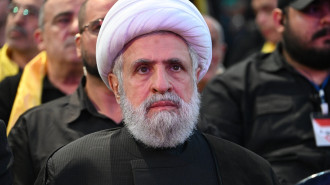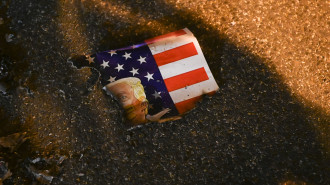Trump's Muslim ban: What you need to know
Trump's Muslim ban: What you need to know
Round-up: The top developments related to the US president's controversial ban on nationals of seven Muslim-majority nations from entering the US, including permanent residents.
3 min read
The visa ban affects even holders of green cards [Getty]
Here are the top five things you need to know about today's breathtaking events, as Donald John Trump carried out his threat to ban - some - Muslims from entering the US on security grounds, by means of an executive order.
1. The countries whose nationals are affected
Citizens from Iran, Iraq, Syria, Yemen, Somalia, Sudan, and Libya, even if holding valid visit visas or green cards, will be 'temporarily' barred from entering US territories.
2. What are airlines doing?
Airlines in the Middle East have said they would enforce the Trump Ban. EgyptAir already barred an Iraqi family and a Yemeni national from boarding planes bound to New York this morning.
Gulf carriers - including Qatar Airways - have said they would stop nationals of the countries affected from boarding planes with direct routes to US airports.
Some airlines seemed unaware the ban extends to permanent residents from the countries included and may have allowed some to fly onwards to the US, where they face detention on arrival.
3. What happens if barred nationals make it to the US?
Already, reports are emerging of mass detentions on arrival, after which many face deportation.
The New York Times reported that airport officials as early as Friday night began detaining travelers, some of whom already had been aboard their flights when Trump announced his executive order closing America’s borders to refugees.
Lawyers are advising those carrying green cards to refuse to surrender them, as this would mean forfeiting their permanent residence rights. Protests have reportedly been called at JFK Terminal 4 later today to demand an immediate end to the ban.
4. What about people with visas and green cards already in the US?
It is feared those with valid visas, including students, and residence permits will not be allowed back into the US once they leave. Aware of this, Google had already recalled foreign staff with visas back into the US before the ban took effect.
5. There are legal challenges already
Leading American figures are speaking out against the ban, although many have remained silent. Airport detentions have been met with early legal challenges, as lawyers representing two Iraqi refugees being held at New York’s John F. Kennedy Airport filed a court appeal for their release, alleging that the two travelers were being unlawfully detained.
More protests and legal actions are to be expected in the coming days and weeks.
On Saturday, the American Civil Liberties Union and other advocacy groups filed a legal challenge to Trump’s order.
Reacting to Trump’s move, the United Nations urged him to continue his country’s “long tradition” of welcoming refugees and to ensure their equal treatment, regardless of race, nationality or religion.
1. The countries whose nationals are affected
Citizens from Iran, Iraq, Syria, Yemen, Somalia, Sudan, and Libya, even if holding valid visit visas or green cards, will be 'temporarily' barred from entering US territories.
2. What are airlines doing?
Airlines in the Middle East have said they would enforce the Trump Ban. EgyptAir already barred an Iraqi family and a Yemeni national from boarding planes bound to New York this morning.
Gulf carriers - including Qatar Airways - have said they would stop nationals of the countries affected from boarding planes with direct routes to US airports.
Some airlines seemed unaware the ban extends to permanent residents from the countries included and may have allowed some to fly onwards to the US, where they face detention on arrival.
3. What happens if barred nationals make it to the US?
Already, reports are emerging of mass detentions on arrival, after which many face deportation.
The New York Times reported that airport officials as early as Friday night began detaining travelers, some of whom already had been aboard their flights when Trump announced his executive order closing America’s borders to refugees.
Lawyers are advising those carrying green cards to refuse to surrender them, as this would mean forfeiting their permanent residence rights. Protests have reportedly been called at JFK Terminal 4 later today to demand an immediate end to the ban.
4. What about people with visas and green cards already in the US?
It is feared those with valid visas, including students, and residence permits will not be allowed back into the US once they leave. Aware of this, Google had already recalled foreign staff with visas back into the US before the ban took effect.
5. There are legal challenges already
Leading American figures are speaking out against the ban, although many have remained silent. Airport detentions have been met with early legal challenges, as lawyers representing two Iraqi refugees being held at New York’s John F. Kennedy Airport filed a court appeal for their release, alleging that the two travelers were being unlawfully detained.
More protests and legal actions are to be expected in the coming days and weeks.
On Saturday, the American Civil Liberties Union and other advocacy groups filed a legal challenge to Trump’s order.
Reacting to Trump’s move, the United Nations urged him to continue his country’s “long tradition” of welcoming refugees and to ensure their equal treatment, regardless of race, nationality or religion.





 Follow the Middle East's top stories in English at The New Arab on Google News
Follow the Middle East's top stories in English at The New Arab on Google News


